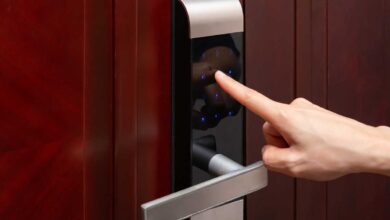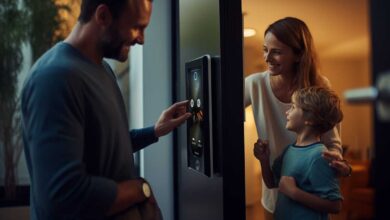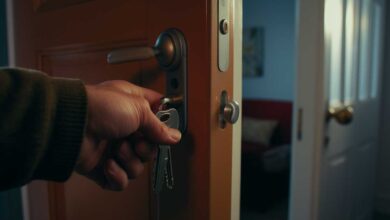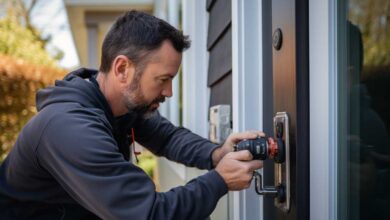Common Challenges In High-Security Lock Installation And How To Overcome Them
KEY TAKEAWAYS
High-security locks are an essential component of modern security systems, offering unparalleled protection against unauthorized access. However, the installation of these locks is not always straightforward. From selecting the right lock to ensuring its proper functioning, there are several challenges that professionals and DIY enthusiasts alike may encounter.
In this article, we’ll delve into the most common challenges in high-security lock installation and provide actionable solutions to overcome them.
Understanding Common Challenges In High-Security Lock Installation
High-security lock installation may present several challenges; however, these can be successfully managed with professional guidance, careful planning, and an understanding of the product’s specifications.
Selecting The Right Lock
Challenge: With a plethora of options available in the market, choosing the right high-security lock can be overwhelming. Factors such as the type of door, the level of security required, and the budget can influence the decision.
Solution: Research is key. Understand the security needs of the property and consult with professionals. Brands like Medeco, ASSA Abloy, and Mul-T-Lock are renowned for their high-security locks. Ensure that the chosen lock has the necessary certifications and meets industry standards.
Installation Challenges
Inadequate Tools
Challenge: High-security locks often require specialized tools for installation. Using inappropriate tools can damage the lock or the door.
Solution: Always refer to the manufacturer’s guidelines. Invest in the right set of tools or hire a professional locksmith who is equipped with the necessary tools.
Misalignment
Challenge: A common issue faced during installation is the misalignment of the lock with the door frame. This can prevent the lock from functioning correctly.
Solution: Ensure that the door and frame are properly aligned before starting the installation. Use a level to check alignment and make necessary adjustments.
Incorrect Hole Size
Challenge: Drilling a hole that’s too big or too small can render the lock ineffective.
Solution: Measure twice and drill once. Always refer to the manufacturer’s specifications for the correct hole size.
Maintenance And Upkeep
Challenge: Like all mechanical devices, high-security locks require regular maintenance to function optimally. Neglecting this can lead to malfunctions.
Solution: Schedule regular check-ups and cleaning. Lubricate the lock mechanism as recommended by the manufacturer. If the lock starts showing signs of wear or malfunction, consult a professional.
Overcoming Common Issues
Key Getting Stuck
Challenge: Over time, the key may get stuck in the lock, making it difficult to turn or remove.
Solution: Regularly clean and lubricate the lock. If the problem persists, it might be due to a worn-out key or a damaged lock cylinder. In such cases, seek professional help.
Electronic Lock Malfunctions
Challenge: Modern high-security locks often come with electronic components. These can malfunction due to various reasons, including battery failure or software issues.
Solution: Regularly check the battery and replace it as needed. Ensure that the lock’s software is updated. If the problem persists, consult the manufacturer or a locksmith.
Difficulty In Locking/Unlocking
Challenge: Sometimes, the lock might become difficult to lock or unlock, indicating a potential issue with the mechanism.
Solution: Check for any obstructions or debris in the lock. Clean and lubricate the mechanism. If the issue persists, it might be time for a replacement.
Choosing The Appropriate Locking Mechanism
Challenge: The locking mechanism is the heart of any security system. With various mechanisms available, such as deadbolts, mortise locks, and smart locks, making the right choice becomes crucial.
Solution: Understand the specific needs of the property:
-
Deadbolts: Ideal for exterior doors, they offer a high level of security. Single-cylinder deadbolts are common for residential properties, while double-cylinder deadbolts are recommended for doors with glass panels to prevent unauthorized access, even if the glass is broken.
-
Mortise Locks: These are often used in commercial properties due to their durability and strength. They are installed inside the door, making them harder to tamper with.
-
Smart Locks: Suitable for those who prefer keyless entry and remote access. They can be integrated with home automation systems and can provide logs of entry and exit.
Always consult with a security expert or locksmith to determine the best locking mechanism for your needs.
Ensuring A Secure Fit For The Lock Cylinder
Challenge: The lock cylinder is where the key is inserted, and ensuring its secure fit is paramount. An ill-fitted cylinder can compromise the security of the entire lock.
Solution:
-
Correct Sizing: Ensure that the lock cylinder is of the appropriate size for the door thickness. A cylinder that protrudes too much can be a vulnerability.
-
Anti-Snap Features: Opt for cylinders that come with anti-snap features. This prevents burglars from snapping the cylinder and gaining access.
-
Reinforcement: Consider adding a security escutcheon or a cylinder guard. This provides an additional layer of protection against forced entry.
Securing Connections With Lever Handle Locks
Challenge: Lever handle locks are commonly used due to their ease of use, especially in commercial settings. However, ensuring that they are securely connected is essential to prevent them from being easily bypassed.
Solution:
-
Use Through Bolts: Instead of just relying on screws, use through bolts that go through the door. This ensures a stronger connection and makes it harder for intruders to force the lever handle.
-
Regular Maintenance: Over time, lever handles can become loose. Regularly check for any signs of wear or looseness and tighten the connections as needed.
-
High-Quality Materials: Opt for lever handle locks made of robust materials like stainless steel or brass. These materials are not only durable but also resistant to tampering.
What Is A High-Security Lock?
A high-security lock is not just any ordinary lock. It is specifically designed to offer enhanced resistance against tampering, picking, drilling, and other unauthorized access methods. These locks often come with unique keyways and complex internal mechanisms and are made of robust materials that can withstand physical attacks. Additionally, many high-security locks have patented key control systems, ensuring that duplicate keys can’t be easily made without proper authorization.
Benefits Of High-Security Locks
-
Enhanced Security: As the name suggests, these locks provide a higher level of security compared to standard locks, making them almost impervious to common break-in techniques.
-
Durability: Made from high-quality materials, these locks are built to last, ensuring long-term protection.
-
Key Control: The unique and patented key designs prevent unauthorized duplication, giving property owners peace of mind.
-
Investment Protection: While they might be more expensive initially, their longevity and robustness can save property owners from potential losses due to break-ins.
Reasons To Hire An Expert Locksmith
Some challenges when installing high-security locks may require the services of a professional locksmith:
Professionalism And Experience
An expert locksmith is not just a tradesperson; they are security professionals. With years of experience under their belt, they understand the intricacies of different locking systems and can provide insights and recommendations tailored to individual needs.
Knowledge Of Different Lock Types
From deadbolts to smart locks, an expert locksmith is well-versed with the plethora of lock types available in the market. This knowledge ensures that they can advise on the best lock type for a specific security requirement.
Access To Quality Products And Tools
Professional locksmiths have access to high-quality locks and tools that might not be readily available to the general public. This ensures that the installation is done using the best products and with the utmost precision.
Ability To Troubleshoot Issues Quickly
Locks can be complex, and issues can arise during installation or even later. An expert locksmith can quickly identify and rectify these issues, ensuring that the lock functions optimally.
Tips For Property Owners And Business Owners On Lock Installation
Before diving into the world of high-security locks, it’s essential to understand your security needs and goals:
-
Assess Vulnerabilities: Identify potential weak points in your property. Are there any doors or windows that are more susceptible to break-ins?
-
Determine Security Levels: Not all areas might require the same level of security. For instance, a storage room with valuable equipment might need higher security than a general office room.
-
Budget Considerations: While security is paramount, it’s also essential to work within a budget. Understand the trade-offs between cost and security to make an informed decision.
-
Future-Proofing: Consider future needs. If you’re looking at integrating a security system or home automation, ensure the lock you choose is compatible.
Frequently Asked Questions
To provide a better understanding of the common challenges in high-security lock installation, we have answered some of the most commonly asked questions.
What makes a lock “high-security”?
A high-security lock is designed with advanced features that resist tampering, picking, drilling, and other unauthorized access methods. They often have unique keyways, complex internal mechanisms, and are made from robust materials.
Are high-security locks worth the investment?
Absolutely. While high-security locks might have a higher initial cost, their durability, enhanced security features, and longevity make them a valuable investment, especially when considering potential losses from break-ins.
Can I install a high-security lock myself?
While it’s possible for DIY enthusiasts to install locks, it’s recommended to hire a professional locksmith. They have the necessary tools, expertise, and can ensure the lock functions optimally.
How often should I maintain or check my high-security lock?
Regular maintenance, such as cleaning and lubrication, should be done at least once a year. However, if you notice any issues or changes in the lock’s performance, consult a locksmith immediately.
Are smart locks considered high-security?
Not all smart locks are high-security. While smart locks offer convenience and advanced features like remote access, it’s essential to ensure they also have high-security mechanisms in place. Always check for certifications and reviews before purchasing.
Can I get duplicate keys for my high-security lock?
High-security locks often come with patented key control systems. This means that duplicates can only be made with proper authorization, usually by presenting a security card or code to a certified locksmith or dealer.
Overcoming The Challenges In High-Security Lock Installation
While there are numerous common challenges in high-security lock installation, with the right knowledge and tools, these can be easily overcome. Regular maintenance and timely interventions can ensure that these locks provide the desired level of security for years to come. Whether you’re a professional locksmith or a DIY enthusiast, understanding these challenges and their solutions can make the installation process smoother and more efficient. By understanding these additional challenges and their respective solutions, one can further ensure the security and longevity of their high-security lock installations. Whether it’s choosing the right locking mechanism, ensuring the lock cylinder fits securely, or making sure lever handle locks are tamper-resistant, every detail matters in the realm of security.
Learn more about how to keep your home and family secure by exploring our comprehensive guide on the pros and cons of smart door locks. Visit Security Forward to learn more.





